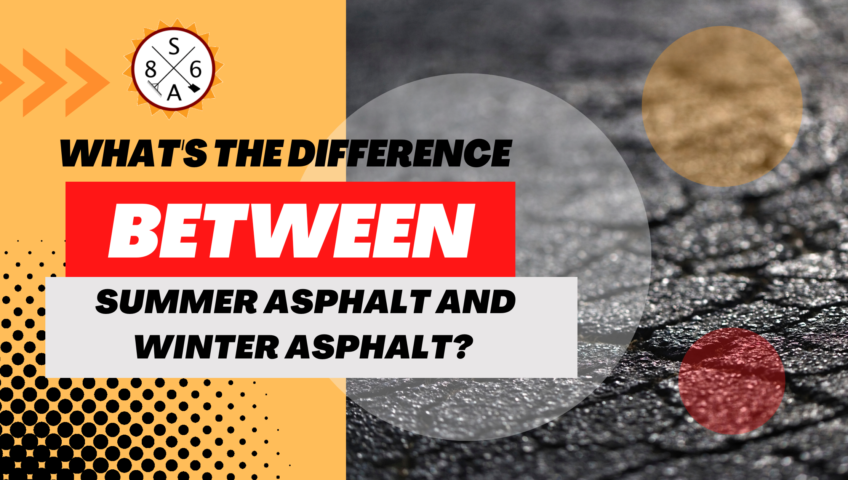
Good Asphalt Paving Job vs. Bad One – What To Look For
When you work with an asphalt contractor, you want to know that the job is going to be done right the first time. A good asphalt paving job is done with care, and is going to last for years, while poorly done asphalt paving is going to have a number of complications until it fails completely. The thickness of the asphalt overlay, the asphalt surface transitions, the drainage protocol, and the application of primer all play a role in how well the entire job is completed.
The Thickness of the Asphalt Overlay
Any good asphalt contractor is going to use a minimum or two inches of asphalt when they complete an asphalt paving job. This is an industry standard, and one that is followed by all reputable asphalt contractors worth hiring. If the company tries to spend less money to complete the job, they might try to get away with using only one inch of asphalt. This is going to cause the paving to crack, and does not provide a stable base for your completed project. If the company you want to hire only uses an inch of asphalt, it’s time to look further for a new contractor.
The Asphalt Surface Transitions
Surface transitions are important to how a newly covered driveway looks, and how smooth the transition is between the driveway and the road. There shouldn’t be any bumps in between the driveway, sidewalk, or road when you hire a quality asphalt contractor. When it comes to quality work, a smooth, seamless driveway without noticeable transition areas is a job well done.
The Drainage Protocol
It is important that water drains well off of your asphalt paving, as water can break down the surface of your asphalt if it is left to pool. A good drainage protocol will ensure that any water that lands on your asphalt surface runs off and away from the asphalt that has been laid down. Without a good drainage protocol, you will notice puddles on the asphalt, or water accumulating at the end of your driveway that will cause damage to the asphalt.
The Application of Primer
Primer is used to help new asphalt adhere to any old asphalt that is already in place. If you are paving over a surface, primer is used to prevent the new asphalt from breaking down quickly once it is laid on top of an old surface. If the application of primer is ignored, the asphalt contractor is missing a critical step in the process of good asphalt paving.
If you are looking for an asphalt paving contractor, it is important to ask questions. Learn what type of primer is used in the process of laying down an asphalt surface, and ask how thick the initial asphalt is. Understand that the industry standard is two inches of asphalt, and anything less is going to result in a surface that is prone to cracks. A good drainage plan is necessary, and you will want to know how well the asphalt contractor is able to handle transitions. Take the time to do your research, and understand what it takes to do a paving job well.
When you work with an asphalt contractor, you want to know that the job is going to be done right the first time. A good asphalt paving job is done with care, and is going to last for years, while poorly done asphalt paving is going to have a number of complications until it fails completely. The thickness of the asphalt overlay, the asphalt surface transitions, the drainage protocol, and the application of primer all play a role in how well the entire job is completed.
The Thickness of the Asphalt Overlay
Any good asphalt contractor is going to use a minimum or two inches of asphalt when they complete an asphalt paving job. This is an industry standard, and one that is followed by all reputable asphalt contractors worth hiring. If the company tries to spend less money to complete the job, they might try to get away with using only one inch of asphalt. This is going to cause the paving to crack, and does not provide a stable base for your completed project. If the company you want to hire only uses an inch of asphalt, it’s time to look further for a new contractor.
The Asphalt Surface Transitions
Surface transitions are important to how a newly covered driveway looks, and how smooth the transition is between the driveway and the road. There shouldn’t be any bumps in between the driveway, sidewalk, or road when you hire a quality asphalt contractor. When it comes to quality work, a smooth, seamless driveway without noticeable transition areas is a job well done.
The Drainage Protocol
It is important that water drains well off of your asphalt paving, as water can break down the surface of your asphalt if it is left to pool. A good drainage protocol will ensure that any water that lands on your asphalt surface runs off and away from the asphalt that has been laid down. Without a good drainage protocol, you will notice puddles on the asphalt, or water accumulating at the end of your driveway that will cause damage to the asphalt.
The Application of Primer
Primer is used to help new asphalt adhere to any old asphalt that is already in place. If you are paving over a surface, primer is used to prevent the new asphalt from breaking down quickly once it is laid on top of an old surface. If the application of primer is ignored, the asphalt contractor is missing a critical step in the process of good asphalt paving.
If you are looking for an asphalt paving contractor, it is important to ask questions. Learn what type of primer is used in the process of laying down an asphalt surface, and ask how thick the initial asphalt is. Understand that the industry standard is two inches of asphalt, and anything less is going to result in a surface that is prone to cracks. A good drainage plan is necessary, and you will want to know how well the asphalt contractor is able to handle transitions. Take the time to do your research, and understand what it takes to do a paving job well.

